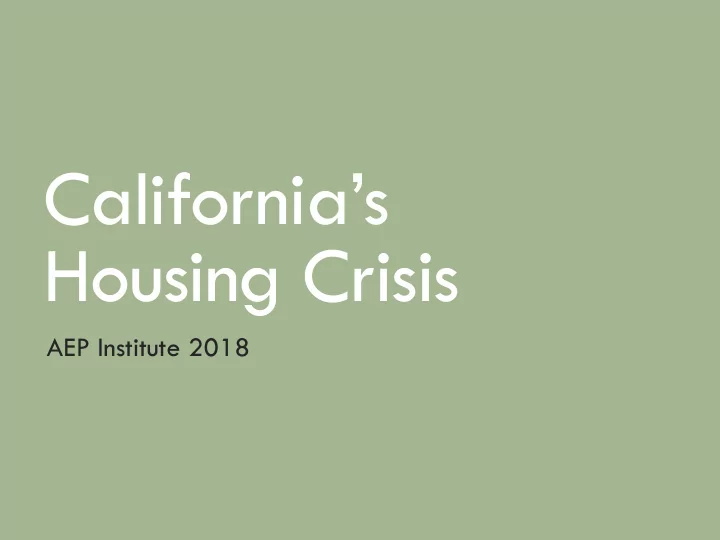

California’s Housing Crisis AEP Institute 2018
In California… ▪ CA’s poverty ranking is 1st among all states when housing costs are considered. ▪ Nearly 1 in 4 homeless Americans reside in CA. ▪ 1.5 million CA renter households pay 50% or more of their income for rent. ▪ CA’s homeownership rate has dropped from just under 57% in 2000, to less than 54% in 2015. ▪ Today, just 31% of California households can afford the median-priced home (Q1 2018). ▪ The housing crisis impacts CA’s access to health care, increases GHG emissions from long commutes, and threatens our long- term prosperity.
Today we will talk about: • Affordability Gaps • Rental Households • Ownership Households • Demand Trends • Production Shortfall • Key Issues: • Pace of Supply • Homelessness
Affordability Gap Rental Households
High Household Incomes, Also High Poverty Rates CA & US 2016 American Community Survey US Census $66,000 14.4% 14.3% 14.2% $64,000 14.0% $62,000 13.8% $60,000 13.6% $58,000 13.4% $63,783 $56,000 13.2% $54,000 13.0% $55,322 $52,000 12.8% 12.7% $50,000 12.6% CA US Median HH Income % Persons in Poverty CA has higher median household incomes but also greater % of people living in poverty than US
Minimum Wage to Afford Rent CA is 2nd highest in US (after Hawaii)
Rising Median Rents In many high-cost markets, the amount of rent federal Housing Choice Vouchers will cover is capped based on the Federal Housing and Urban Development (HUD) Fair Market Rent, which can fall significantly below the market rent. This, combined with too few available rentals and landlords who are unwilling to accept vouchers at all, is exacerbating the problem.
Rent Burden by Household Income Category
Rent Burden by Race
Who Is Impacted by Severe Rent Burdens?
Estimate of Current Affordable Rental Supply Gap
Affordability Gap Ownership Households
CA Affordability Index 2006-2018 Percent of California Households That Can Afford Median House Price 2006-2018
Low and Declining Ownership Rates
CA Homeownership by Race
CA Affordability Index Q1 2018 By Location Percent of Households That Can Afford Median Sale Price by Location Q1 2018
Rising House Prices
Rising House Prices Median Sale Price: $483,400 as of June 30, 2018 Source: Zillow, Inc. June 30, 2018. Available at: https://www.zillow.com/ca/home-values/ Accessed 2 August 2018
Rising Rent Prices Median Rent List Price: $2,795 / month as of June 30, 2018 Source: Zillow, Inc. June 30, 2018. Available at: https://www.zillow.com/ca/home-values/ Accessed 2 August 2018
CA Homeownership Compared to Other States
Demand Trends
Strong CA Household Growth CA & US ▪ Through 2025, the highest percentage of household growth is expected to occur in the Bay Area, Southern California, and Central Valley communities. ▪ Between 2014 and 2015, approximately 25 percent of population growth came from migration from other states and countries; and 75 percent of population growth was attributable to births within California.
Strong CA Employment Growth CA & US
Modest Income Growth Real Median Household Income in California ▪ Forty-three percent of all Californian households are lower-income (incomes that are 0-80 percent of AMI for their county), but the percentages differ between renter and owner households: 29 percent of owner households and 61 percent of renter households in California are lower-income. ▪ Households in each income category that are rent burdened, paying more than 30 percent of income toward rent, and severely rent burdened, paying more than 50 percent of income toward rent.
Increasing Inequity in Household Incomes CA & US Source: Cedar Lake Ventures, Inc. Data from the U.S. Census Bureau. Updated April 17, 2015. Statistical Atlas. Available at: https://statisticalatlas.com/state/California/Household-Income Accessed 2 August 2018.
High Poverty Rates CA & US ▪ Studies show that a child’s adulthood earning potential is reduced every year a child grows up in neighborhoods of poverty in comparison to children who reside in better neighborhoods Demonstrates the mismatch ▪ between job availability and where past housing production occurred. The land use decisions of the State’s areas of greatest opportunity affect the economic mobility opportunities for the rest of the State if California continues these growth trends, the inland and disadvantaged communities will continue to see high household growth during the next 10 years.
Rising Homelessness Source: U.S. Department of Housing and Urban Development, Office of Community Planning and Development. December 2017. The 2017 Annual Homeless Assessment Report (AHAR) to Congress. Available at: https://www.hudexchange.info/resources/documents/2017-AHAR-Part-1.pdf
Production Shortfall
New Housing Supply • CA used to build more housing per year; peak year – 1986 (over 300,000 units) • Recovery has only grown to ~ 100,000 units per year level Housing Permits 1954-2016
Shortfall per SB35 RHNA Report Source: California Department of Housing & Community Development, Division of Housing Policy. July 12, 2018. Available at: http://www.hcd.ca.gov/community-development/housing-element/docs/SB_35_HE_OpenDataMappingWebinar.pdf Accessed 2 August 2018.
Recent Production and Future Shortfall
The Geography of Housing Production Shortfalls 4th Housing Element Cycle
Shortfall Most Severe for Low- Income Households
Causes of the Housing Crisis ▪ Stagnant or declining household incomes ▪ Scarce land supply/ resistance to density ▪ High development costs (especially in coastal areas) ▪ For affordable housing, declining federal funding and loss of CA Redevelopment $ ▪ Complex entitlement processes ▪ Mismatch between new units and incomes
Possible Policy Solutions For new development: For existing housing supply: ▪ Utilize publicly owned lands ▪ Raise minimum wage ▪ Streamline/incentive ▪ Expand rent controlled approvals process supply ▪ Recent 2017/2018 housing ▪ Expand ownership subsidy laws focus on these policies programs (silent 2nds, down ▪ Invest in infrastructure payment assistance, etc.) ▪ Refine and scale pre-fab production ▪ Subsidize affordable housing production ▪ Expand Inclusionary Housing programs
Recommend
More recommend